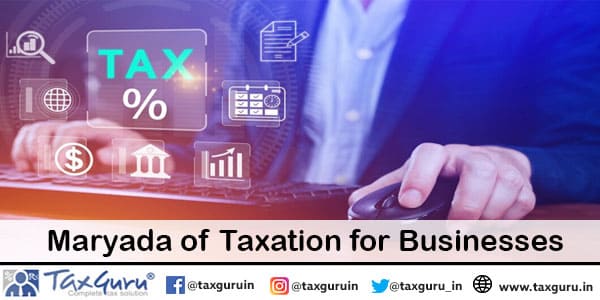Introduction: As we celebrate Ram Navami, honoring Lord Ram’s commitment to maryada, it’s crucial for businesses to adhere to their own prescribed limits in taxation. Understanding Income Tax and GST thresholds is essential to operate legally and avoid repercussions.
Arjuna (Fictional Character): Krishna, This week we will be celebrating Ram Navami the birth of Maryada Purushottam Shri Ram. How excited are you to celebrate this auspicious event?
Krishna (Fictional Character): Arjuna, Ram Navami is celebrated with great enthusiasm in our country. Shri Ram is also known as Maryada Purushottam. It is very important for each and everyone of us to know our Maryadas (Limits) and to follow them. For Businesses too they shall very well know the Turnover and Income limits specified in the GST and Income Tax Laws while doing business to run their business without any legal trouble.
Arjuna (Fictional Character): Krishna, What are the various Income Tax and GST Maryadas (Limits) that the taxpayers must know?
Krishna (Fictional Character): Arjuna, following are the 10 points which a taxpayer should know about Income tax Act and Good and services Act :
1) Mandatory Tax Audits: A tax audit is mandatory if
A. Total sales, turnover, or gross receipts of a business exceed Rs. 1 crore in a financial year. This threshold increases to Rs. 10 crores if cash transactions are limited to 5% or less of total receipts and payments.
B. For professionals if gross receipt exceeds Rs. 50 lakhs. This threshold increases to Rs. 75 Lakhs if cash transactions are limited to 5% or less of total receipts and payments.
2) Cash Transaction: Under the Income Tax Act, any business expenditure above Rs. 10,000 paid in cash in a single day is disallowed and cash receipt exceeding Rs. 2 lakhs with a single person in one day attract a 100% penalty to the receiver of the cash.
3) Presumptive Taxation: Under Section 44 AD, Small businesses with a turnover less than Rs. 2 crores ( Rs 3 Crore if cash payment and receipts less than 5% of total payment and receipts) and Under Section 44 ADA professional service providers with turnover less than Rs 50 Lakhs ( Rs. 75 lakhs if cash payment and receipts less than 5% of total payment and receipts) are eligible for presumptive taxation, which simplifies tax calculations by allowing them to declare income at a prescribed rate.

4) TDS Provisions: Under Section 194 -IB Individuals / HUF not liable to audit u/s 44AB, to deduct taxes for rent paid to a resident exceeding Rs 50,000 per month and when there is purchase of Immovable property buyer is required to Deduct TDS if property cost more than Rs.50 lakhs while paying the seller under section 194-IA.
5) SFT Transactions Reporting: Following transactions should be reported if they exceed the limits:
i) Cash Deposits in Current Account exceed Rs. 50 lakhs
ii) Cash Deposit in other Account other than Current Accounts exceed Rs. 10 Lakhs
iii) Payment for credit Card exceeds Rs. 1 lakh in cash or Rs. 10 Lakhs in any other mode
iv) Purchase of Bonds, debentures, shares, foreign currency and buy back of Shares exceeds Rs.10 lakhs
6) GST Registration Threshold: Businesses supplying only goods with a turnover exceeding Rs. 40 lakhs and Businesses supplying goods or services with a turnover exceeding Rs. 20 lakhs (Rs. 10 lakhs in special category states) are required to register for GST.
7) QRMP Scheme: Under GST, All taxpayers whose aggregate annual turnover (PAN based) is up to ₹ 5 Crore in the current financial year and the preceding financial year (if applicable) and have already filed their last due Form GSTR-3B return, are eligible for the QRMP scheme.
8) Composition Scheme: Small businesses with annual turnover up to Rs. 1.5 crore can opt for the GST composition scheme, which simplifies tax payments and compliance by charging tax at a reduced rate. However, these businesses cannot claim Input Tax Credit.
9) E-Invoicing Requirements: From 1 August 2023, e-invoicing is mandatory for businesses with turnovers exceeding Rs. 5 crores in any previous financial year for B2B and Export Transactions.
10) MSME payments: Any payments owed to MSMEs, should be resolved within 45 days or else it will not qualify for tax deductions until the payment is made.
Arjuna (Fictional Character): Krishna, what should one learn from this?
Krishna (Fictional Character): Arjuna, just as we celebrate Lord Ram’s commitment to maryada on Ram Navami, we must remember to apply these principles in our daily activities, including our business operations. Businesses too should follow the prescribed limits in Income Tax and GST laws to stay away from any legal consequences .
Conclusion: Just as Lord Ram exemplified maryada, businesses must adhere to taxation limits outlined in Income Tax and GST laws. By staying compliant with these thresholds, they can operate smoothly and avoid legal consequences, ensuring a path of integrity and prosperity.




